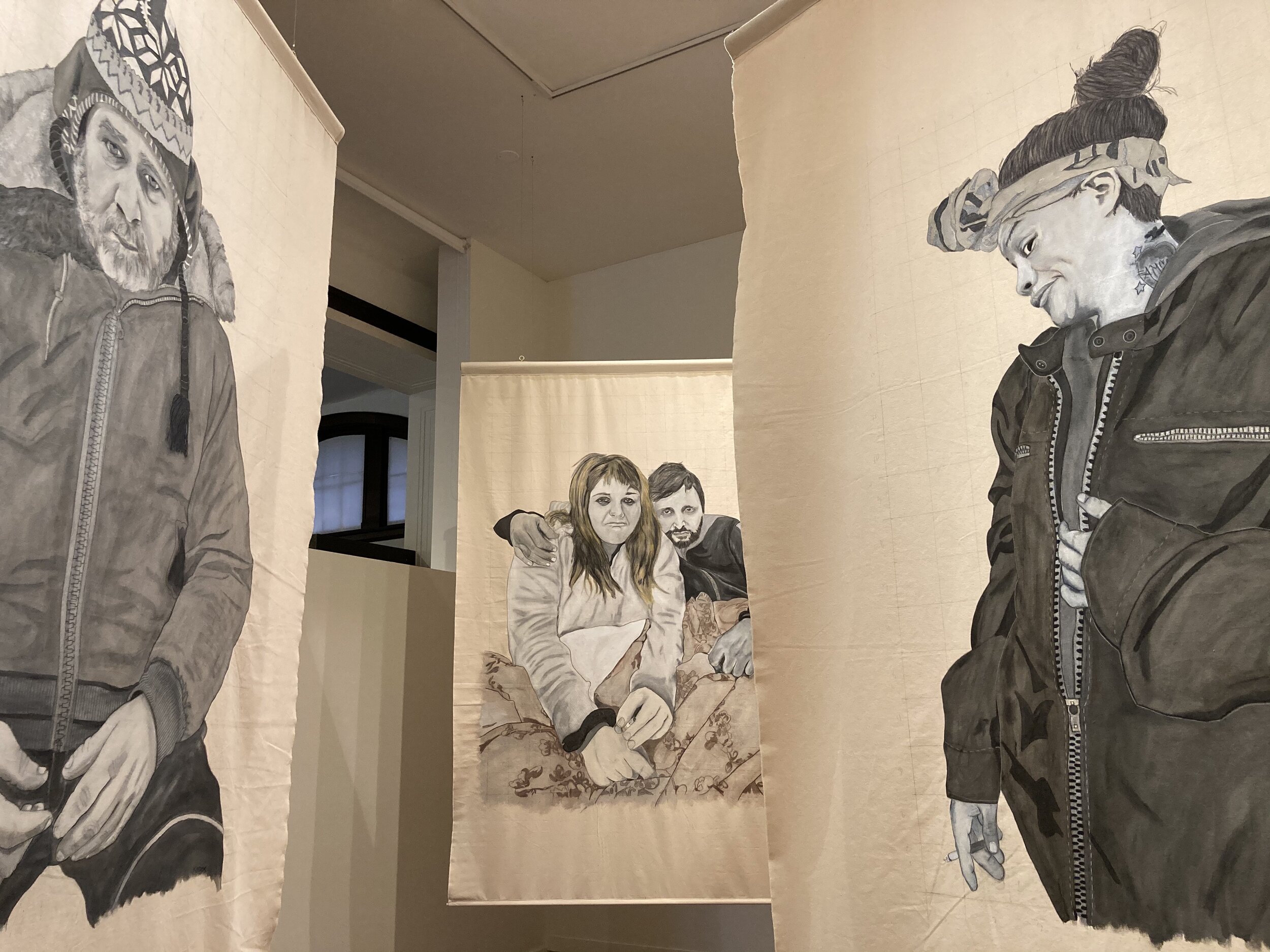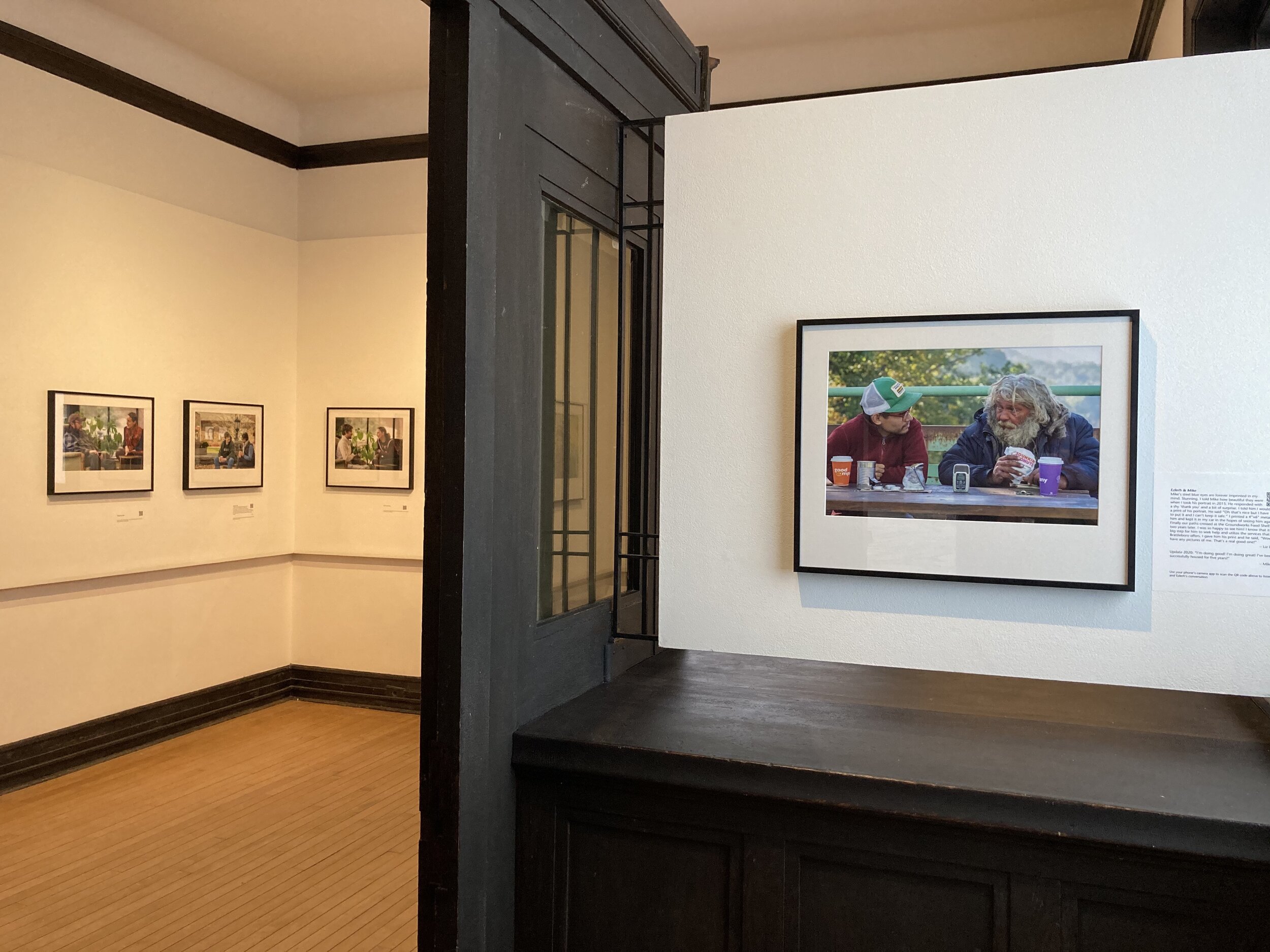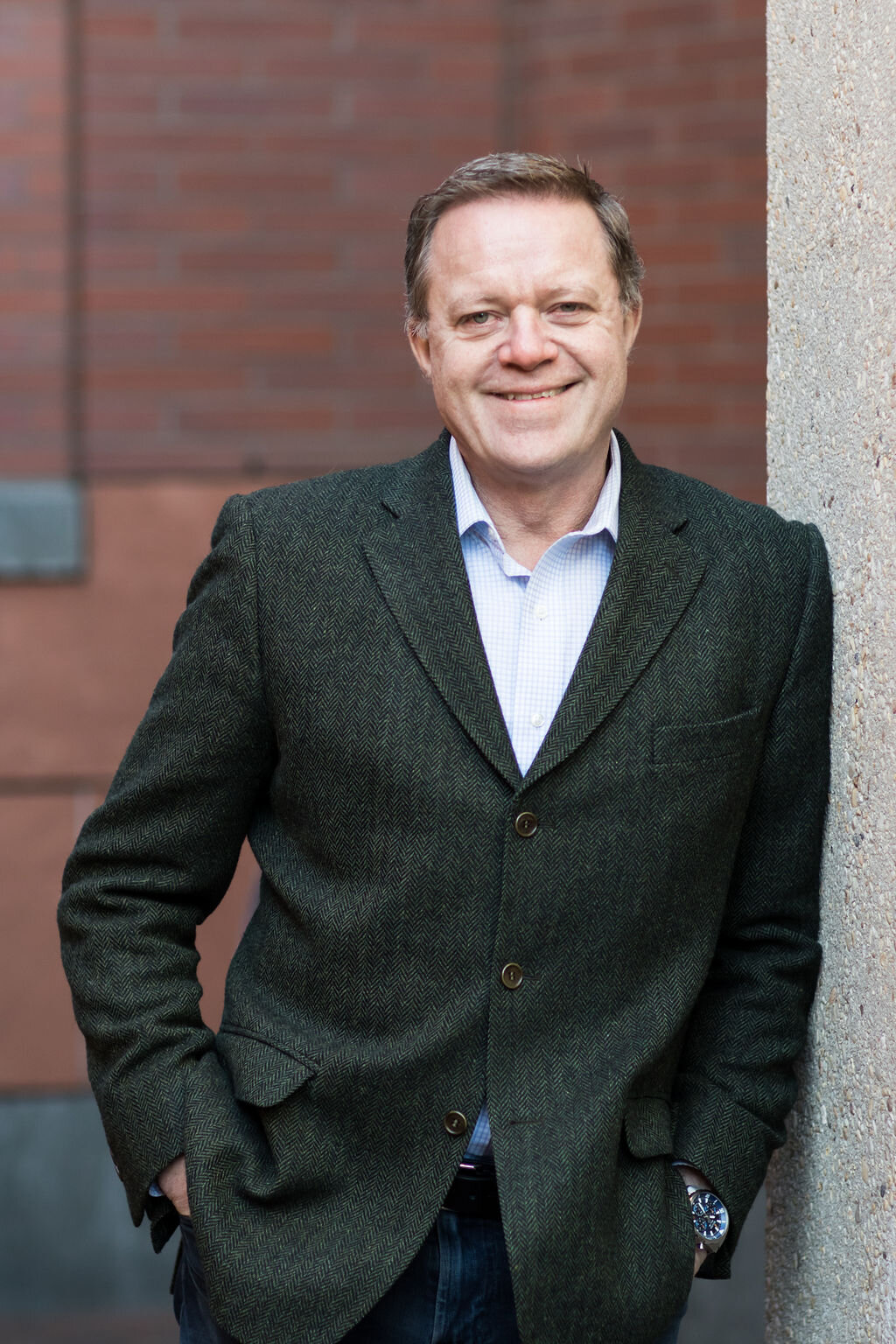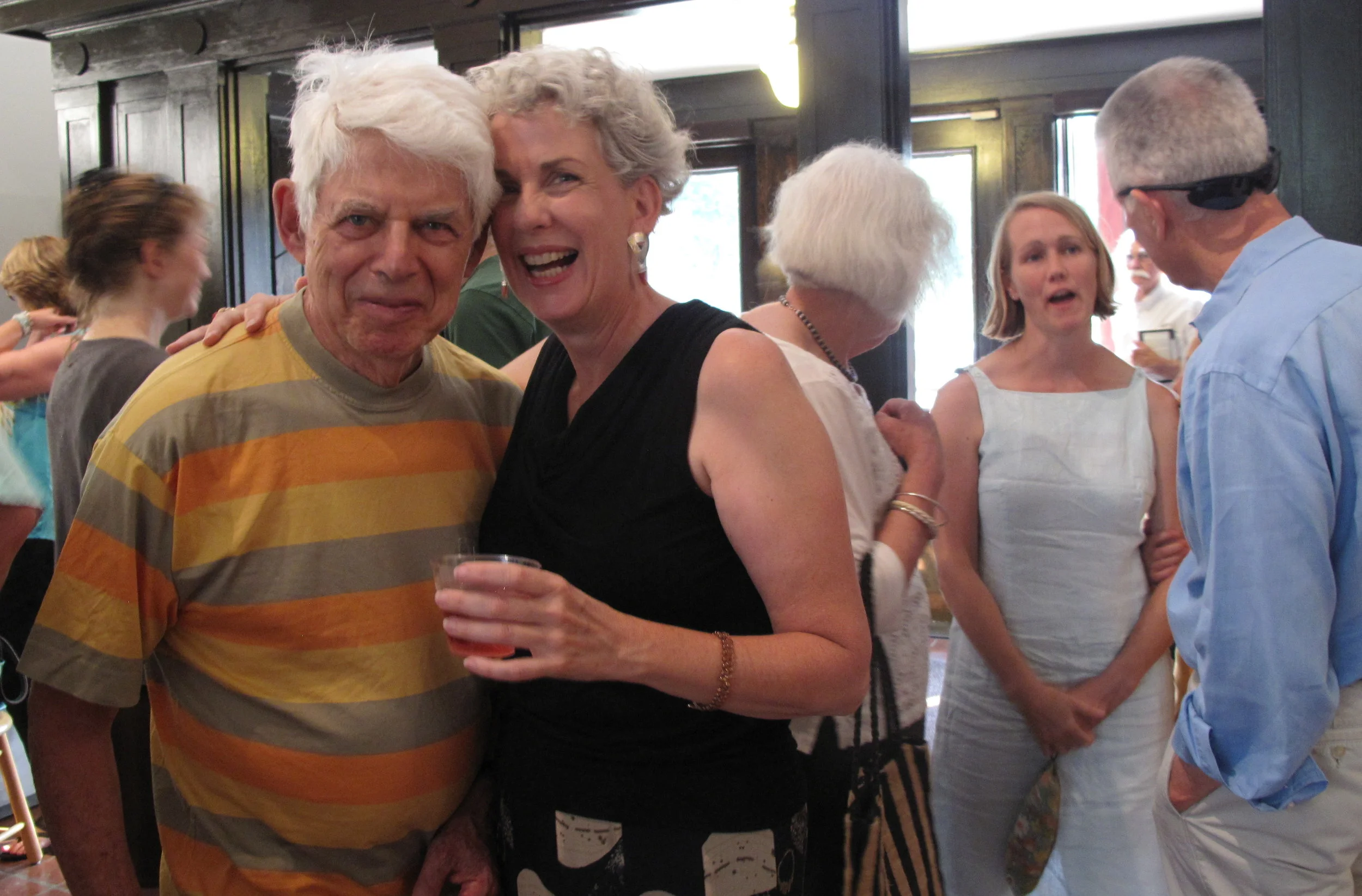“A deeper dive on the issue of homelessness”
Joshua Davis is the executive director of Groundworks Collaborative, which provides ongoing support to families and individuals facing housing and food insecurities in the greater Brattleboro area. This year, BMAC worked with Groundworks to present two exhibits and a series of events related to homelessness. The exhibits, Steven Kinder: 522,830 and Coffee & Conversation: Stories of Homelessness, opened on March 14 and closed the next day due to the coronavirus pandemic.
Happily, we were able to reopen our galleries in June. All of our current exhibits have been extended through October 12, and the events have been rescheduled to take place online. We spoke with Davis recently about the project.
BMAC: Why is it useful for Groundworks Collaborative to work with BMAC on these exhibits and events? In what ways does it serve your mission?
Davis: We’re collaborating with the Museum on this project in large part to raise awareness of the humanity of people experiencing homelessness. We’ve also been able to develop some programming that helps to illuminate the inequitable system that perpetuates homelessness. It’s a rare opportunity to be able to do a deeper dive on the issue of homelessness in a way that would be challenging for us to do alone and that allows us to reach a much broader audience.
BMAC: What are your thoughts on the two exhibits, Steven Kinder: 522,830 and Coffee & Conversation: Stories of Homelessness?
Davis: Very often in the work we do, people get reduced to a demographic or a label. A person’s story—the humanity of the individual experiencing homelessness—is lost in the conversation. The person is stigmatized on multiple levels in multiple ways, whether that’s through the health care system, the school system, employment, justice, housing—it’s pretty rampant. It’s not often that you get to hear somebody's story and connect with them on a human level. I think that is the spirit of what Steven Kinder is bringing to his art, especially since it’s larger than life. And the way it’s displayed, where you’re having to look up at his pieces, really demands and commands your attention and puts the person front and center.
This connects to “Coffee and Conversation: Stories of Homelessness.” Around the time that Groundworks was formed, there was a lot of discussion around people on the street, around panhandling. We had a number of community conversations, and out of that came a real push to hear people’s stories. Liz Lavorgna took that on, and she did a great job. The goal of the project is to humanize folks who are not largely afforded that opportunity.
BMAC: We have three homelessness-related events coming up in the next few weeks, each of which approaches the issue from a different angle. Why is it important to talk about homelessness from these varied perspectives?
Davis: There’s been energy lately in Brattleboro around people on the streets who are asking for money, folks who are hanging out on the street. Then you have the Steven Kinder exhibit, with its larger-than-life representation of folks on the streets in New York. We started thinking about how people’s perceptions and consciousness could be altered by that exhibit.
In Sight: What the Unseen are Holding for Society with Brattleboro Retreat therapist Kurt White, Thurs., Sept. 10, 7:30 p.m.
That sparked a really interesting question that the Museum connected with Brattleboro Retreat therapist Kurt White on, which led to the title of his talk, In Sight: What the Unseen are Holding for Society. Embedded in that title, for me, is a question around shifting the value narrative about people who are on the streets and who are very often thought of as having no value in society. Having Kurt coming at the topic from a clinician’s point of view will be fascinating—and it’s rarely done, at least not in this neck of the woods. We’re fortunate to have Kurt in our community. He’s a brilliant mind, and I’m really excited about his discussion.
Homelessness: The Big Picture with University of Pennsylvania professor Dennis Culhane, Wed., Sept. 23, 7:30 p.m.
I’m a little starstruck that Dennis Culhane is going to be speaking. I couldn’t be more excited to hear what he has to say. In my world, at least, it feels like a big star is coming to town. I started in my job in 2008, and in that year, Culhane released a paper called “Rearranging the Deck Chairs or Reallocating the Lifeboats?: Homelessness Assistance and Its Alternatives.” That paper was a watershed moment for me about how we need to be working on housing for people, not just getting people sheltered. It has influenced the direction for Groundworks over the last eight years and has been the bedrock from which my work began. The ideas that are in that paper are still relatively cutting-edge. We’re seeing the effects throughout the country in terms of communities ending homelessness, especially veterans’ homelessness, and I think that’s in large part because of the influence that Culhane’s work has had on policy and resource allocation. He’s one of the few researchers who has made the case for ending homelessness. It has become common sense, but he is one of the few who has actually done significant and substantial research on the topic. It’s so valuable to have someone like him come in and explain how the system is broken, because all too often the gut reaction is to blame the individual for their situation and be blind to the systemic implications that lead to somebody becoming homeless and experiencing homelessness over a longer duration.
Kurt White’s talk will provide the opportunity to experience our own internal stigma, Culhane’s talk will address the importance of illuminating a broken system, and the housing panel will contextualize that within Windham County. We didn’t want to just talk about the emergency housing system, but about the emergency housing system as one part of a larger housing continuum. We want to illustrate what the housing system in Brattleboro really looks like—the opportunities and the challenges.
And especially as we are going through a pandemic, we’re seeing things happen in our housing system that we couldn’t have fathomed before March. For all intents and purposes, we've interrupted homelessness throughout the state of Vermont. Those folks who were experiencing homelessness have been given the opportunity of finding shelter in motels. Now the question is, how do we sustain this interruption in homelessness instead of releasing people back onto the streets in the face of low vacancy in this community? This is why we have Bill Murray, a local real estate agent, on the housing panel, to speak to that. I’m hearing that a lot of folks from out of the area are coming in, and that people are paying cash above asking price. This was not the case in February. So what are the ramifications of that, short-term and long-term, for Brattleboro?
Our goal with the panel was to present a rich cross section of people in the housing field. In addition to Murray, we have Elizabeth Bridgewater [executive director of Windham & Windsor Housing Trust], an affordable housing developer. We have the banks represented by Dan Yates [president and CEO of Brattleboro Savings & Loan], who has a long-term perspective on supporting mortgages in the community. We have Adam Grinold [executive director of the Brattleboro Development Credit Corporation], who can talk about housing and economic development. I’ll be the moderator, so of course I’ll have a focus on how this impacts folks who have housing challenges and people experiencing homelessness.
BMAC: How have Groundworks’ clients been affected by covid?
Davis: Because of the eviction moratorium, we haven't seen additional folks being evicted or becoming homeless. What it has allowed us to do is quantify the number of people in Vermont who are homeless. The primary tool that we use is a point-in-time count, which is an annual count of everybody in the community on one day. What the pandemic has done is push a lot of people who were experiencing homelessness or who were precariously housed into motels. A group of folks who were largely invisible were all of a sudden all in motels, not just in Brattleboro but throughout the state. So we were able to wrap our arms around the numbers a bit better than we usually can. Now that we have that data, to some degree it just becomes about the mathematics of matching people to the resources they need, and matching people to housing. Then you start to think about lack of affordable housing, and the lack of opportunities that we have to offer people who are ready for housing. We have resources, we have supports to get into housing, but the housing isn’t there. So it’s underscored the very tight housing availability in this community.
BMAC: What has this collaboration with BMAC been like for you?
Davis: I think it’s remarkable that the Brattleboro Museum & Art Center has taken such an interest and been such a willing partner—not only hosting this discussion but really being a leader. This would not have happened without their leadership. BMAC sees this as such a pressing issue. The question they’re asking is: How do we participate in this discussion, and how do we make a contribution? And I think that’s a great question for all of us to ask. The Museum has been able to use their resources and their influence to bring this discussion to bear. We have momentum around the issue, and we have a socially conscious museum that wants to lean into difficult issues with such leadership, care and commitment. It’s something I’m really grateful for.
Please join us for these online events:
In Sight: What the Unseen are Holding for Society with Brattleboro Retreat therapist Kurt White, Thurs., Sept. 10, 7:30 p.m.
Homelessness: The Big Picture with University of Pennsylvania professor Dennis Culhane, Wed., Sept. 23, 7:30 p.m.
No Place Like Home: Housing in Windham County with Josh Davis and a panel of local housing experts, Wed., Oct. 7, 7:30 p.m.
Attendees at these free events will be invited to make a donation to Groundworks Collaborative.















